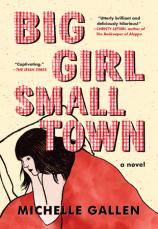Big Girl, Small Town
Review
Big Girl, Small Town
I appreciate the jacket copy writer for Michelle Gallen’s debut novel, BIG GIRL, SMALL TOWN, since he or she alerted me to the existence of the Comedy Women in Print Prize, for which the book was shortlisted earlier this year. This British award highlights many authors who might be unfamiliar to American readers but whose work is worth seeking out --- especially if it’s as well written as Gallen’s novel is.
Don’t get me wrong: BIG GIRL, SMALL TOWN (and, I suspect, many of the other prize nominees) is hardly a knee-slapper, though there are certainly instances of genuine laugh-out-loud humor and cringeworthy moments of recognition. It is both funny and sad, which makes it all the more worthwhile to read.
"BIG GIRL, SMALL TOWN...is hardly a knee-slapper, though there are certainly instances of genuine laugh-out-loud humor and cringeworthy moments of recognition. It is both funny and sad, which makes it all the more worthwhile to read."
The central character is Majella, a young woman who still lives with her mother in the small Northern Ireland town of Aghybogey where she has spent her whole life. Not only does she know everyone’s name in town, she also knows their preferred dinner order at A Salt and Battered!, the chip shop where she works the night shift. Majella --- who is on the autism spectrum, though the book never names her condition --- structures her days around a routine of sleep, work, avoiding her alcoholic mother and watching reruns of “Dallas.” The year is 2000, and Northern Ireland has uneasily entered a new phase in its history, after decades of paramilitary IRA activities that resulted in the death of Majella’s uncle and the disappearance of her father.
Readers also discover early in the novel that Majella’s grandmother has recently died, following an unsolved attack. The Aghybogey residents suspect that the perpetrator lives among them, which creates an atmosphere of suspicion and uncertainty that lurks beneath the narrative. Structured around Majella’s extensive lists of “things she wasn’t keen on” (e.g., scented stuff, noise) and the much shorter list of things she enjoys (e.g., sex, “Dallas”), and written in a third-person voice that reflects her matter-of-fact point of view, the story often asks readers to fill in the things that remain unsaid. They include Majella’s response to her grandmother’s death, her increasing frustration about her mother’s drinking and helplessness, and --- especially as the novel progresses --- her memories of things that happened to her when she was younger.
There’s not much overt plot in BIG GIRL, SMALL TOWN, and I suspect that’s by design. Readers are brought along with Majella as she undergoes her predictable routine each day, alternating between work and her bedroom, with a few disruptions, such as an outing to purchase a duvet or an appointment to hear the reading of her grandmother’s will. We get a front-row glimpse into the monotony of Majella’s life (including a chip-shop customer who places the same order and makes the same inappropriate joke every day at the same time) and consequently will be intrigued to consider what she will do when she gets the opportunity to break what might otherwise be an endless pattern.
BIG GIRL, SMALL TOWN is also extremely raunchy (which is where much of the humor arises) and includes, um, vivid descriptions of many bodily processes. Readers won’t always feel comfortable but will not forget this character any time soon.
Reviewed by Norah Piehl on December 4, 2020
Big Girl, Small Town
- Publication Date: December 1, 2020
- Genres: Fiction
- Paperback: 320 pages
- Publisher: Algonquin Books
- ISBN-10: 1643750895
- ISBN-13: 9781643750897




